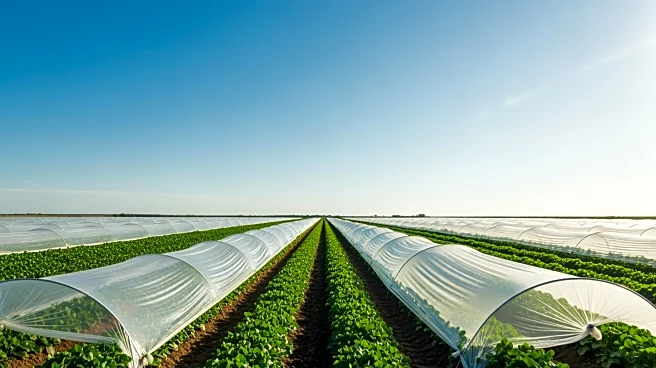What's Happening?
Agricultural films, including greenhouse covers and mulching sheets, are transforming farming practices by enhancing crop quality and sustainability. In 2024, the global market for these films was valued at nearly $14 billion, with projections indicating
growth to over $23 billion in the next decade. These films help farmers control environmental conditions, protect crops from pests and harsh weather, and reduce reliance on chemical pesticides. They also conserve water and optimize irrigation, aligning with the push for sustainable agriculture. The market is segmented by type, material, and geography, with Asia-Pacific leading adoption due to supportive policies and high-value crops.
Why It's Important?
The use of agricultural films is crucial in meeting the rising demand for high-quality food amidst growing populations and unpredictable climate patterns. These films enable farmers to produce crops that are fresh, safe, and nutrient-rich, while also minimizing environmental damage. By reducing chemical inputs and conserving water, agricultural films contribute to sustainable farming practices. The shift towards biodegradable films further addresses environmental concerns, offering a balance between productivity and sustainability. As the market expands, agricultural films are set to play a vital role in modern farming, helping farmers meet consumer expectations and regulatory demands.
What's Next?
The agricultural films market faces challenges such as high installation costs and plastic waste concerns. However, innovations in biodegradable films and greenhouse designs offer solutions that balance productivity with sustainability. Farmers adopting these innovations can improve yields and demonstrate environmental responsibility, which is increasingly valued by consumers and export markets. As the industry evolves, agricultural films will continue to be integral in modern farming, driving a blend of science, technology, and sustainability.
Beyond the Headlines
Agricultural films represent a quiet revolution in farming, offering profound impacts on agriculture, food quality, and the environment. They empower farmers to grow more with less, while meeting the expectations of regulators and consumers. The push towards eco-friendly farming is steering the industry towards smarter solutions, reflecting a broader transformation in agriculture.















